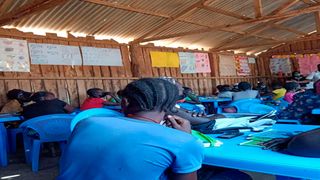
Teenage girls during class at Attan Centre in Ngaremara in Isiolo County.
| Lilys Njeru | Nation Media GroupIsiolo
Premium
A second chance at school: How Isiolo is bringing smiles to young mother’s faces
What you need to know:
- Classrooms are typical of a nursery school but all the learners here are teenage girls.
- In Isiolo County, a high proportion of girls do not attend primary school, and the few who do drop out before reaching secondary.
“Nine divide by three… what do you get?”
This is how a volunteer teacher at Attan Centre in Ngaremara, Isiolo County, begins her math lesson. The learners discuss among themselves before some raise their hands to answer. It’s like any other classroom.
But as you glance around the room, you realise this is not an ordinary class. The charts on the walls showing the alphabet, days of the week and months of the year are what you would expect to find in a nursery class but all the girls here are teenagers. Moreover, they are mothers.
A few metres away is a tiny grass-thatched hut with 20 children and their minders. The fact that most girls have no one to watch over their children as they attend classes, they bring them to the centre and when the bell rings at noon, they rush home for household chores.
“I came here because I wanted to learn how to read road signs, speak Swahili and most importantly, count notes,” says Rose Namodok, 16, a mother of one. She’s one of the 30 girls at the centre.
She dropped out of school while in Standard Two (Grade 2) at 12 years and was later married off to a 60-year-old man.
“I remember bawling and pleading with my uncle that they let me continue with my education but he would hear none of it,” says Namodok.
Girls do not attend school
Her husband, however, allowed her to enroll at the catchment centre. Even so, life has been difficult for her because the man is rarely at home and she has had to juggle between raising a baby, taking care of their four goats and attending classes.
“I sell charcoal, which I have to prepare early in the morning so I don’t miss the classes. Before coming here, I couldn’t add or subtract figures so I depended on my customers to tell me how much change I should give them. I am now good at it and I plan to enroll to a formal school later,” she offers.
In Isiolo County, a high proportion of girls do not attend primary school, and the few who do drop out before reaching secondary. The county’s quality assurance and standards officer, Samuel Kiragu, says around 7,000 school-age children are not in class.
“A big proportion of this number are girls. There are many challenges that attribute to the reason why they are not in school. Some come from poor backgrounds, such that their parents cannot afford basic necessities like stationeries. There are also issues like insecurity and retrogressive cultural practices such as early child marriages. Further, since most individuals here are pastoralists, accessing education when they relocate is quite a challenge,” he says.
Due to insecurity plaguing the region, Mr Kiragu said mobile schools that moved with the pastoralists like Horura Primary have since been closed.
A few kilometres from the centre, Roseline Ngimat, 17, a mother of two, hastens to prepare lunch as her first-born son, who is in nursery school, will soon be home. Roseline returned to class so she could learn how to read and gain skills that would help in her hairdressing business.
“I was walking home one day in January when I heard about the centre from some of my peers. When I told my husband about it, he liked the idea and encouraged me to enroll. He is my biggest supporter. We wake up early each morning and as I prepare our first-born to school, he’s out there tethering goats,” she says.

Teenage girls during class at Attan Centre in Ngaremara in Isiolo County.
The classes, which run for six to nine months, are offered three times a week, three hours a day. The project, Education for Life, is implemented by a consortium of three partners, VSO Kenya, Leonard Cheshire and ActionAid, and funded by the UKAid.
“The overall objective of the project is to improve girls’ life chances through learning, transition and sustainability. We offer them four pathways, including enrolment to formal schools, vocational training and entrepreneurship,” says Patricia Makau, VSO project officer, Education For Life.
“It’s open to girls aged between 10-19 years. It targets 5,000 out-of-school girls, including those with disabilities, from marginalised communities and low-income households.”
Janet Ekura, 23, is a student at Mount Kenya University pursuing a diploma in special needs education under a school-based program that allows her to study during the holidays. When she’s not on campus, she’s at the centre working as a volunteer teacher.
“We teach the girls math, English and Swahili. We also offer mentorship sessions to them on various aspects of life. Among the 30 learners, there are those who couldn’t even write their own names. Others were too shy to speak in front of other students. Now most of them can read albeit with some difficulties and write. This has boosted their self-esteem,” she says.
The Global Education Summit on Financing Global Partnership for Education (GPE) 2021-2025 will take place today and tomorrow. It will be a platform for partners to chart a way forward to transform education systems in partner countries, through exchanging best practices, examining the latest evidence, hearing from experts and young people from around the world, as well as well as learning from what works in other sectors.





